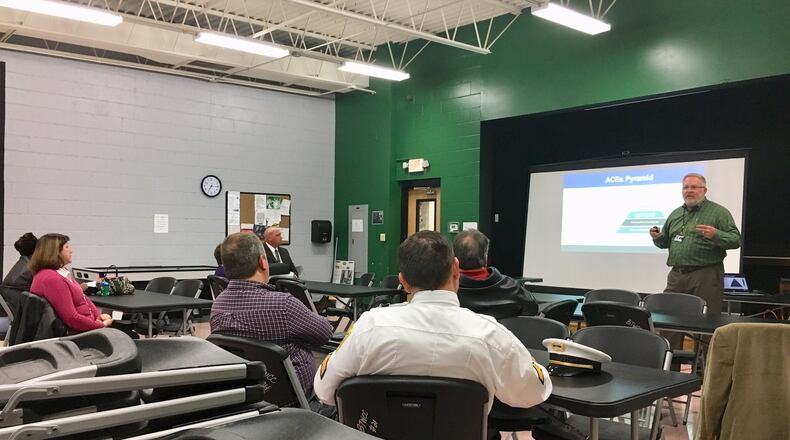The audience was small at the Booker T. Washington Community Center with less than a half dozen residents joining school and Hamilton city police officials, but Greene took the opportunity to ask Knapp some pointed questions.
And though his answers may not sway her enough to vote for the 10-year, 1.5-mill school security tax on the Nov. 6 ballot — she said she was impressed with the informational campaign being conducted by city school officials.
“They are being transparent about where the (tax) money is going to go,” she said after the meeting.
Knapp said the legal restrictions on the new type of school levy, which only became law in Ohio last March, is one of the tax issue’s main selling points.
“The money (raised by the tax) is to help kids and keep them safe,” through funding armed guards, mental health counselors and security technology upgrades, Knapp said.
“The money can only be spent on security and not anything else,” he said.
Hamilton — along Fairfield, Edgewood, Monroe and New Miami schools — has used the new state law to form for the first time a collective school tax district and are asking voters in their districts to approve a property tax increase.
Officials from all five districts have adopted a campaign theme that mental health counseling — for identifying and helping troubled students who may be violence or bullying risks — is the main benefit for residents to approve the tax hike, though the tax will also pay for more armed security officers in schools.
But the five-district, safety tax levy has drawn opposition from some local officials, most notably Butler County Sheriff Richard Jones, who has described it as a “money grab.”
Knapp countered that claim by saying “the Hamilton (tax) money will stay in Hamilton Schools.”
If voters in a school system do not approve the new tax — but the tax wins voter approval in other participating districts — residents in the district where the tax was defeated will still have to pay the tax increase and will also receive the new funds for their local schools.
Early voting started in Ohio on Oct. 10.
The average annual tax increase should the security tax win voter approval will be $52 on a $100,000 home. The tax would begin collection in January 2019.
City resident David Vernot said he plans to vote for the school tax in large part because its funds will address the need for more mental health counselors in schools to help identify and assist troubled students, some of whom may be prone to violence.
“They (school officials) are trying to deal with foundational issues” behind school violence, Vernot said.
Knapp and other school district officials will hold another townhall meeting on the proposed tax at 7 p.m. Oct. 23 at Lindenwald United Methodist Church, 3501 Pleasant Ave. in Hamilton.
About the Author
